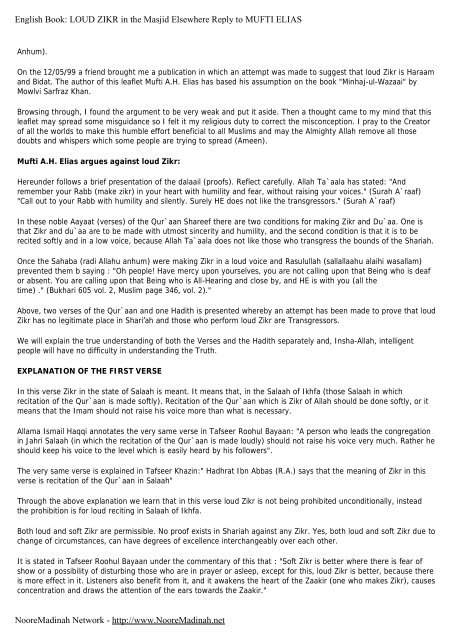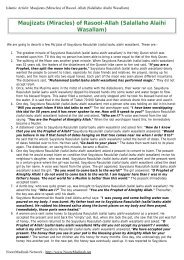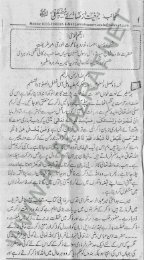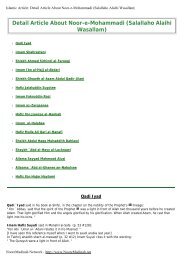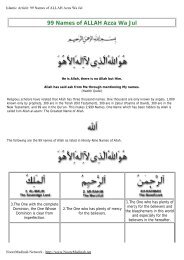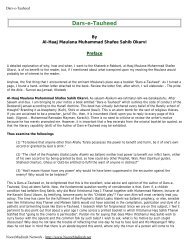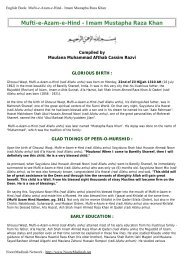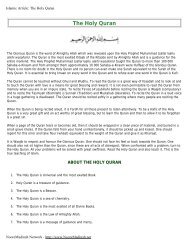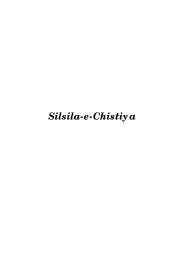LOUD ZIKR in the Masjid & Elsewhere & Reply to MUFTI ELIAS
LOUD ZIKR in the Masjid & Elsewhere & Reply to MUFTI ELIAS
LOUD ZIKR in the Masjid & Elsewhere & Reply to MUFTI ELIAS
Create successful ePaper yourself
Turn your PDF publications into a flip-book with our unique Google optimized e-Paper software.
English Book: <strong>LOUD</strong> <strong>ZIKR</strong> <strong>in</strong> <strong>the</strong> <strong>Masjid</strong> <strong>Elsewhere</strong> <strong>Reply</strong> <strong>to</strong> <strong>MUFTI</strong> <strong>ELIAS</strong><br />
Anhum).<br />
On <strong>the</strong> 12/05/99 a friend brought me a publication <strong>in</strong> which an attempt was made <strong>to</strong> suggest that loud Zikr is Haraam<br />
and Bidat. The author of this leaflet Mufti A.H. Elias has based his assumption on <strong>the</strong> book "M<strong>in</strong>haj-ul-Wazaai" by<br />
Mowlvi Sarfraz Khan.<br />
Brows<strong>in</strong>g through, I found <strong>the</strong> argument <strong>to</strong> be very weak and put it aside. Then a thought came <strong>to</strong> my m<strong>in</strong>d that this<br />
leaflet may spread some misguidance so I felt it my religious duty <strong>to</strong> correct <strong>the</strong> misconception. I pray <strong>to</strong> <strong>the</strong> Crea<strong>to</strong>r<br />
of all <strong>the</strong> worlds <strong>to</strong> make this humble effort beneficial <strong>to</strong> all Muslims and may <strong>the</strong> Almighty Allah remove all those<br />
doubts and whispers which some people are try<strong>in</strong>g <strong>to</strong> spread (Ameen).<br />
Mufti A.H. Elias argues aga<strong>in</strong>st loud Zikr:<br />
Hereunder follows a brief presentation of <strong>the</strong> dalaail (proofs). Reflect carefully. Allah Ta`aala has stated: "And<br />
remember your Rabb (make zikr) <strong>in</strong> your heart with humility and fear, without rais<strong>in</strong>g your voices." (Surah A`raaf)<br />
"Call out <strong>to</strong> your Rabb with humility and silently. Surely HE does not like <strong>the</strong> transgressors." (Surah A`raaf)<br />
In <strong>the</strong>se noble Aayaat (verses) of <strong>the</strong> Qur`aan Shareef <strong>the</strong>re are two conditions for mak<strong>in</strong>g Zikr and Du`aa. One is<br />
that Zikr and du`aa are <strong>to</strong> be made with utmost s<strong>in</strong>cerity and humility, and <strong>the</strong> second condition is that it is <strong>to</strong> be<br />
recited softly and <strong>in</strong> a low voice, because Allah Ta`aala does not like those who transgress <strong>the</strong> bounds of <strong>the</strong> Shariah.<br />
Once <strong>the</strong> Sahaba (radi Allahu anhum) were mak<strong>in</strong>g Zikr <strong>in</strong> a loud voice and Rasulullah (sallallaahu alaihi wasallam)<br />
prevented <strong>the</strong>m b say<strong>in</strong>g : "Oh people! Have mercy upon yourselves, you are not call<strong>in</strong>g upon that Be<strong>in</strong>g who is deaf<br />
or absent. You are call<strong>in</strong>g upon that Be<strong>in</strong>g who is All-Hear<strong>in</strong>g and close by, and HE is with you (all <strong>the</strong><br />
time) ." (Bukhari 605 vol. 2, Muslim page 346, vol. 2)."<br />
Above, two verses of <strong>the</strong> Qur`aan and one Hadith is presented whereby an attempt has been made <strong>to</strong> prove that loud<br />
Zikr has no legitimate place <strong>in</strong> Shari’ah and those who perform loud Zikr are Transgressors.<br />
We will expla<strong>in</strong> <strong>the</strong> true understand<strong>in</strong>g of both <strong>the</strong> Verses and <strong>the</strong> Hadith separately and, Insha-Allah, <strong>in</strong>telligent<br />
people will have no difficulty <strong>in</strong> understand<strong>in</strong>g <strong>the</strong> Truth.<br />
EXPLANATION OF THE FIRST VERSE<br />
In this verse Zikr <strong>in</strong> <strong>the</strong> state of Salaah is meant. It means that, <strong>in</strong> <strong>the</strong> Salaah of Ikhfa (those Salaah <strong>in</strong> which<br />
recitation of <strong>the</strong> Qur`aan is made softly). Recitation of <strong>the</strong> Qur`aan which is Zikr of Allah should be done softly, or it<br />
means that <strong>the</strong> Imam should not raise his voice more than what is necessary.<br />
Allama Ismail Haqqi annotates <strong>the</strong> very same verse <strong>in</strong> Tafseer Roohul Bayaan: "A person who leads <strong>the</strong> congregation<br />
<strong>in</strong> Jahri Salaah (<strong>in</strong> which <strong>the</strong> recitation of <strong>the</strong> Qur`aan is made loudly) should not raise his voice very much. Ra<strong>the</strong>r he<br />
should keep his voice <strong>to</strong> <strong>the</strong> level which is easily heard by his followers".<br />
The very same verse is expla<strong>in</strong>ed <strong>in</strong> Tafseer Khaz<strong>in</strong>:" Hadhrat Ibn Abbas (R.A.) says that <strong>the</strong> mean<strong>in</strong>g of Zikr <strong>in</strong> this<br />
verse is recitation of <strong>the</strong> Qur`aan <strong>in</strong> Salaah"<br />
Through <strong>the</strong> above explanation we learn that <strong>in</strong> this verse loud Zikr is not be<strong>in</strong>g prohibited unconditionally, <strong>in</strong>stead<br />
<strong>the</strong> prohibition is for loud recit<strong>in</strong>g <strong>in</strong> Salaah of Ikhfa.<br />
Both loud and soft Zikr are permissible. No proof exists <strong>in</strong> Shariah aga<strong>in</strong>st any Zikr. Yes, both loud and soft Zikr due <strong>to</strong><br />
change of circumstances, can have degrees of excellence <strong>in</strong>terchangeably over each o<strong>the</strong>r.<br />
It is stated <strong>in</strong> Tafseer Roohul Bayaan under <strong>the</strong> commentary of this that : "Soft Zikr is better where <strong>the</strong>re is fear of<br />
show or a possibility of disturb<strong>in</strong>g those who are <strong>in</strong> prayer or asleep, except for this, loud Zikr is better, because <strong>the</strong>re<br />
is more effect <strong>in</strong> it. Listeners also benefit from it, and it awakens <strong>the</strong> heart of <strong>the</strong> Zaakir (one who makes Zikr), causes<br />
concentration and draws <strong>the</strong> attention of <strong>the</strong> ears <strong>to</strong>wards <strong>the</strong> Zaakir."<br />
NooreMad<strong>in</strong>ah Network - http://www.NooreMad<strong>in</strong>ah.net


